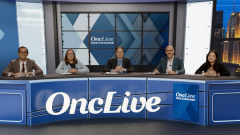
Rationale Behind Discontinuing IO Therapy in Clear Cell RCC
Focused discussion on the rationale behind discontinuing (or continuing) immunotherapy for patients with advanced clear cell renal cell carcinoma.
Episodes in this series

Transcript:
Brian I. Rini, MD:We’re going to move on to the second-line therapy discussion. We’re going to talk about the CONTACT-03 trial [NCT04338269]. I think we’ll stick with the case since we have it in front of us. So I treated this patient with axitinib/pembrolizumab, had a nice PR [partial response] on the initial scans, maintained maybe some axitinib dose adjustments, etc. Actually got to the 2-year mark as [approximately 25%] of patients in KEYNOTE-426 [trial] did. I discontinued the pembrolizumab, which I do because that’s the way KEYNOTE-426 did it. Does anybody not discontinue IO [immuno-oncology] at 2 years? All the trials that have showed a survival benefit have discontinued at 2 years.
Eric Jonasch, MD: I tend to continue it.
Brian I. Rini, MD:I continue.
Bruno R. Bastos, MD: I tend to continue it too. I’ve seen many cases in boards of patients recurring after the discontinuation.
Brian I. Rini, MD:They’ve continued TKI [tyrosine kinase inhibitor] and progressed?
Bruno R. Bastos, MD:: Progressed, yes.
Brian I. Rini, MD:OK. Is that why you do it?
Eric Jonasch, MD: I do it because there’s no mechanistic rationale for discontinuing it…. Part of the reason why we’re perhaps seeing a collapse in the curves in the IO/TKI PFS [progression-free survival] is because of the fact that you’re discontinuing therapy. So it’s an unprovable statement, but generally speaking, I will continue it unless, of course, there’s toxicity. A lot of times there are patients who develop toxicity, and that will define what you give for how long.
Brian I. Rini, MD:I’ll disagree with you a little bit. I don’t think there’s been collapse of the overall survival curves. If you look at that [more complete] analysis, it’s not that patients are progressing and dying. That’s not what’s driving those curves coming together. It’s the [patients taking sunitinib] being rescued. So that was my first thought: “Oh boy, we had better not stop pembrolizumab at 2 years.” Again, the data are not perfect, and we haven’t looked into it completely. I don’t know the clear part of this, but I don’t think that it’s stopping pembrolizumab. I would argue mechanistically, that’s what immune therapy is supposed to do, right? You’re supposed to give it up front, generate an immune response, and then stop.
Bruno R. Bastos, MD: If you have a complete response perhaps it makes more sense to me….. In this case it’s just pembrolizumab or PD-1. I would not stop.
Stephanie A. Berg, DO: I’ll agree with you. I’ll say that ipilimumab is immune therapy that you stop after 4 cycles. We’re trusting that that is causing all these long-term benefits even though it stopped years ago. So I think the idea that you can stop IO does make mechanistic sense, at least in my mind. I will say I have some really lovely treatment-free survival scenarios with IO/TKI, where I’ve stopped both and they’re getting scans and they’re doing well. So most people have those stories related to their [patients taking] ipilimumab/nivolumab. But perhaps because I practice, I have a nice collection of those [instances].
Bruno R. Bastos, MD: If the patient had a complete response, it would make sense to consider discontinuing, but if the patient still has disease on scans, like this patient who had a partial response not a CR [complete response], I will not stop it.
Brian I. Rini, MD:…. We’re not going to resolve this in this session, but it sounds as though there’s uncertainty…. I think there’s real uncertainty about continuing, and it’s just the way it was done in the trial.
Stephanie A. Berg, DO: I mean, all trials nowadays are stopping. Is there a trial that’s actually in kidney cancer that’s making…
Brian I. Rini, MD:Actually, avelumab did not stop.
Stephanie A. Berg, DO: Nivolumab did not. None of the nivolumab studies stopped. I don’t know about the…
Brian I. Rini, MD:And cabozantinib [plus] nivolumab did.
Stephanie A. Berg, DO: Cabozantinib/nivolumab stopped for the IO combination, the combination studies.
Brian I. Rini, MD:It’s a mixed bag. I didn’t want to go too far down that rabbit hole.
Transcript edited for clarity.











































